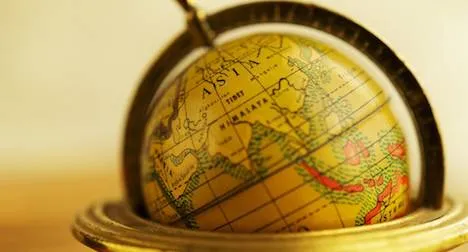
12 Historical Fiction Books in Translation
This content contains affiliate links. When you buy through these links, we may earn an affiliate commission.
This list of historical fiction books in translation is sponsored by THE CASSANDRA, the new novel by Sharma Shields, winner of the Washington State Book Award. Published by Henry Holt & Co.
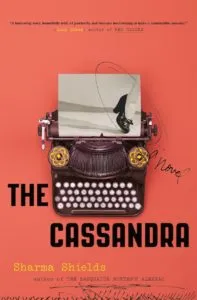 Gifted and cursed with the ability to see the future, Mildred Groves takes a position at the Hanford Research Center in the early 1940s. Hanford tests and manufactures a mysterious product to aid the war effort. Only the top officials know that this product is processed plutonium, to make the first atomic bombs. Inspired by the classic Greek myth, this 20th-century reimagining is based on a real WWII compound. A timely novel about patriarchy and militancy, The Cassandra uses both legend and history to examine man’s capacity for destruction, and the compassion it takes to challenge the powerful.
Gifted and cursed with the ability to see the future, Mildred Groves takes a position at the Hanford Research Center in the early 1940s. Hanford tests and manufactures a mysterious product to aid the war effort. Only the top officials know that this product is processed plutonium, to make the first atomic bombs. Inspired by the classic Greek myth, this 20th-century reimagining is based on a real WWII compound. A timely novel about patriarchy and militancy, The Cassandra uses both legend and history to examine man’s capacity for destruction, and the compassion it takes to challenge the powerful.
Historical fiction is an entryway into a different time, allowing readers to inhabit the worlds of historical characters and events. With historical works translated from other languages into English, readers are transported to different cultures as well. Check out these 12 must-read historical fiction books in translation.
The Shadow of the Wind is one of my favorite novels of all time. Set in Barcelona in 1945 in the aftermath of the Spanish Civil War, this novel follows the story of Daniel, a bookseller’s son who is mourning the death of his mother. When he falls upon a book by mysterious author Julián Carax, discovering that this book might be the last of the author’s books in existence, Daniel’s life is changed forever.
This classic novel from the wonderful Gabriel Garcia Marquez is set in Columbia approximately during the half century between 1880 and 1930. Florentino Ariza and Fermina Daza fall in love in their youth and carry on a secret relationship, exchanging love letters for many years. But when Fermina’s father finds out about the two young lovers, he forces Fermina to stop seeing Florentino. Eventually, Fermina marries a wealthy, well-born doctor, and Florentino is heart broken. Florentino then rises to prominence in his business career, all in the hopes of eventually winning Fermina back once and for all.
Set during the Chinese Cultural Revolution of the late 1960s–mid 1970s, Dai Sijie’s novel is about two young boys who are exiled to a remote Chinese mountain village to be reeducated. Here, the boys meet a young seamstress and discover a hidden treasure: a secret stash of forbidden Western classics translated in Chinese. This is a novel about the transformative powers of literature.
If you love historical fiction with famous historical figures as the central characters, read Empress by Shan Sa, a novel about China’s first and only female emperor, Empress Wu. Set in late seventh century China, the novel follows the controversial empress’s journey from a young girl from the humble Wu clan to a strong leader who ushered in a golden age in China during the Tang Dynasty.
The House of the Spirits is Isabel Allende’s debut novel, in part based on the author’s own familial history. Allende’s novel details the history of the Trueba family through four generations. Though the country and historical figures in the novel are never explicitly named, the novel examines real events in Chile, intertwining a personal family history with the political history of the country, and also more than little bit of magic.
Recently, this novel was adapted into a television show on HBO, but whether or not you’ve seen the show or plan on watching it, Ferrante’s first novel in her Neapolitan series is worth a read. Set in 1950s Naples, the novel is a portrait of two friends, Elena and Lila, growing up in a poor neighborhood full of violence, gangsters, and financial strife. Through the exploration of the girls’ friendship, Ferrante also vividly depicts the life of an entire neighborhood and how the troubles of the neighborhood ultimately transforms both girls.
Set in Tokyo in 1912, Spring Snow is the first novel in Yukio Mishimo’s The Sea of Fertility tetralogy. The political climate is changing; rich families and the social elite are breaching the closed world of ancient Japanese aristocracy. Kiyoaki and Honda are two friends caught up in the tensions of the old and the new, and Honda watches as his friend Kiyoaki falls in love with Satoko, the daughter of an aristocratic family fallen on hard times. When Satoko is promised to a royal prince, Kiyoaki realizes just how much he cares for her.
This novel is set in 19th century Quebec during the coming of the qallunaat, the white people, and examines the daily life of Sanaaq, a young widow, and her daughter, Qumaq. As they live their lives in their semi-nomadic community, the intrusion of the qallunaat and the battle between Catholic and Anglican missionaries threatens to forever change Sanaaq’s community and her family.
This novel is set in a prison camp in Fukuoka, Japan, in 1944, near the end of World War II. Watanabe Yuichi, a young guard with a passion for reading, is ordered to investigate a murder. The victim was a guard who was generally loathed by the prison population. Yet when an inmate comes forth and confesses to the murder, Yuichi has a difficult time believing him. The further he gets into the investigation, in fact, the more Yuichi realizes this prison guard was not who he appeared to be.
This historical novel is set in the 15th century, amidst invasions, massacres, and religious fanaticism surrounding the Arabian Gulf (Lisbon, Cairo, Jeddah, and Istanbul). Oblivious to all of this and to the Portuguese fleets surrounding the Arabian Gulf in the hopes of securing the spice trade, a young girl falls in love with a noble Arabian tribal leader.
This novel is set in Bulgaria during the 1920s and follows two historical figures: the poet Geo Milev and Georgi Sheytanov, a notorious anarchist on the run. The two men start a politically charged literary magazine together in response to a a military coup that established Aleksandar Tsankov as the new leader of Bulgaria. Alternating between this historical period and contemporary Bulgaria, Karastoyanov examines this tale of resistance and the lasting effects it had on the country and the world.
Last but not least, Affections is a novel based on the life of Third Reich cinematographer Hans Ertl and set in South America during the time of Che Guevara in the 1950s and 1960s. The Ertl family flees to Bolivia following the fall of Nazi Germany. After Hans Ertl attempts to lead an expedition in search of a legendary Inca city, his family life begins to fall apart. This novel is told from the perspective of Hans and his daughters as they become involved in the revolution on Bolivia.
What are your favorite historical fiction novels in translation? Let us know in the comments.
 Gifted and cursed with the ability to see the future, Mildred Groves takes a position at the Hanford Research Center in the early 1940s. Hanford tests and manufactures a mysterious product to aid the war effort. Only the top officials know that this product is processed plutonium, to make the first atomic bombs. Inspired by the classic Greek myth, this 20th-century reimagining is based on a real WWII compound. A timely novel about patriarchy and militancy, The Cassandra uses both legend and history to examine man’s capacity for destruction, and the compassion it takes to challenge the powerful.
Gifted and cursed with the ability to see the future, Mildred Groves takes a position at the Hanford Research Center in the early 1940s. Hanford tests and manufactures a mysterious product to aid the war effort. Only the top officials know that this product is processed plutonium, to make the first atomic bombs. Inspired by the classic Greek myth, this 20th-century reimagining is based on a real WWII compound. A timely novel about patriarchy and militancy, The Cassandra uses both legend and history to examine man’s capacity for destruction, and the compassion it takes to challenge the powerful.
Historical fiction is an entryway into a different time, allowing readers to inhabit the worlds of historical characters and events. With historical works translated from other languages into English, readers are transported to different cultures as well. Check out these 12 must-read historical fiction books in translation.

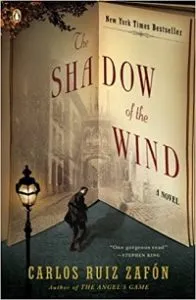 The Shadow of the Wind by Carlos Ruiz Zafón, Translated by Lucia Graves
The Shadow of the Wind by Carlos Ruiz Zafón, Translated by Lucia Graves
The Shadow of the Wind is one of my favorite novels of all time. Set in Barcelona in 1945 in the aftermath of the Spanish Civil War, this novel follows the story of Daniel, a bookseller’s son who is mourning the death of his mother. When he falls upon a book by mysterious author Julián Carax, discovering that this book might be the last of the author’s books in existence, Daniel’s life is changed forever.
 Love in the Time of Cholera by Gabriel Garcia Marquez
Love in the Time of Cholera by Gabriel Garcia Marquez
This classic novel from the wonderful Gabriel Garcia Marquez is set in Columbia approximately during the half century between 1880 and 1930. Florentino Ariza and Fermina Daza fall in love in their youth and carry on a secret relationship, exchanging love letters for many years. But when Fermina’s father finds out about the two young lovers, he forces Fermina to stop seeing Florentino. Eventually, Fermina marries a wealthy, well-born doctor, and Florentino is heart broken. Florentino then rises to prominence in his business career, all in the hopes of eventually winning Fermina back once and for all.
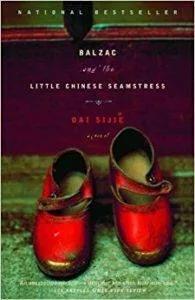 Balzac and the Little Chinese Seamstress by Dai Sijie, Translated by Ina Rilke
Balzac and the Little Chinese Seamstress by Dai Sijie, Translated by Ina Rilke
Set during the Chinese Cultural Revolution of the late 1960s–mid 1970s, Dai Sijie’s novel is about two young boys who are exiled to a remote Chinese mountain village to be reeducated. Here, the boys meet a young seamstress and discover a hidden treasure: a secret stash of forbidden Western classics translated in Chinese. This is a novel about the transformative powers of literature.
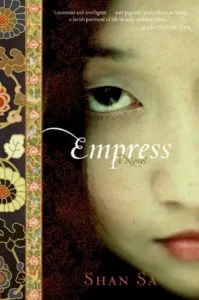 Empress by Shan Sa
Empress by Shan Sa
If you love historical fiction with famous historical figures as the central characters, read Empress by Shan Sa, a novel about China’s first and only female emperor, Empress Wu. Set in late seventh century China, the novel follows the controversial empress’s journey from a young girl from the humble Wu clan to a strong leader who ushered in a golden age in China during the Tang Dynasty.
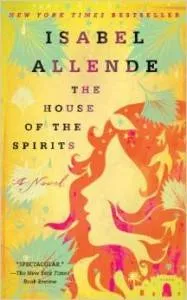 The House of the Spirits by Isabel Allende
The House of the Spirits by Isabel Allende
The House of the Spirits is Isabel Allende’s debut novel, in part based on the author’s own familial history. Allende’s novel details the history of the Trueba family through four generations. Though the country and historical figures in the novel are never explicitly named, the novel examines real events in Chile, intertwining a personal family history with the political history of the country, and also more than little bit of magic.
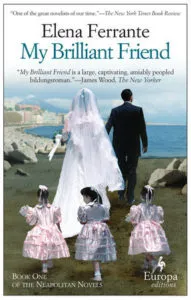 My Brilliant Friend by Elena Ferrante, Translated by Ann Goldstein
My Brilliant Friend by Elena Ferrante, Translated by Ann Goldstein
Recently, this novel was adapted into a television show on HBO, but whether or not you’ve seen the show or plan on watching it, Ferrante’s first novel in her Neapolitan series is worth a read. Set in 1950s Naples, the novel is a portrait of two friends, Elena and Lila, growing up in a poor neighborhood full of violence, gangsters, and financial strife. Through the exploration of the girls’ friendship, Ferrante also vividly depicts the life of an entire neighborhood and how the troubles of the neighborhood ultimately transforms both girls.
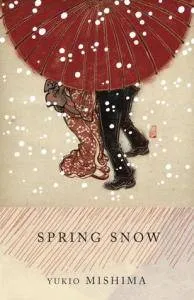 Spring Snow: The Sea of Fertility by Yukio Mishimo
Spring Snow: The Sea of Fertility by Yukio Mishimo
Set in Tokyo in 1912, Spring Snow is the first novel in Yukio Mishimo’s The Sea of Fertility tetralogy. The political climate is changing; rich families and the social elite are breaching the closed world of ancient Japanese aristocracy. Kiyoaki and Honda are two friends caught up in the tensions of the old and the new, and Honda watches as his friend Kiyoaki falls in love with Satoko, the daughter of an aristocratic family fallen on hard times. When Satoko is promised to a royal prince, Kiyoaki realizes just how much he cares for her.
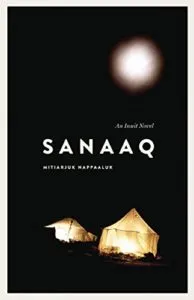 Sanaaq: An Inuit Novel by Mitiarjuk Nappaaluk, Translated by Peter Frost
Sanaaq: An Inuit Novel by Mitiarjuk Nappaaluk, Translated by Peter Frost
This novel is set in 19th century Quebec during the coming of the qallunaat, the white people, and examines the daily life of Sanaaq, a young widow, and her daughter, Qumaq. As they live their lives in their semi-nomadic community, the intrusion of the qallunaat and the battle between Catholic and Anglican missionaries threatens to forever change Sanaaq’s community and her family.
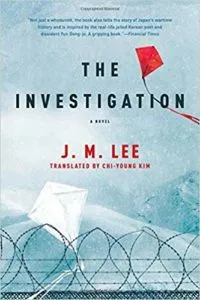 The Investigation by J.M. Lee, Translated by Chi-Young Kim
The Investigation by J.M. Lee, Translated by Chi-Young Kim
This novel is set in a prison camp in Fukuoka, Japan, in 1944, near the end of World War II. Watanabe Yuichi, a young guard with a passion for reading, is ordered to investigate a murder. The victim was a guard who was generally loathed by the prison population. Yet when an inmate comes forth and confesses to the murder, Yuichi has a difficult time believing him. The further he gets into the investigation, in fact, the more Yuichi realizes this prison guard was not who he appeared to be.
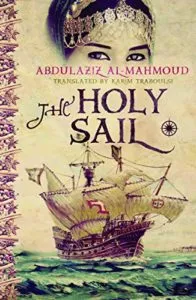 The Holy Sail by Abdulaziz Al-Mahmoud
The Holy Sail by Abdulaziz Al-Mahmoud
This historical novel is set in the 15th century, amidst invasions, massacres, and religious fanaticism surrounding the Arabian Gulf (Lisbon, Cairo, Jeddah, and Istanbul). Oblivious to all of this and to the Portuguese fleets surrounding the Arabian Gulf in the hopes of securing the spice trade, a young girl falls in love with a noble Arabian tribal leader.
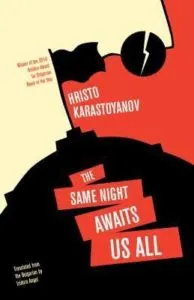 The Same Night Awaits Us All by Hristo Karastoyanov, Translated by Izidora Angel
The Same Night Awaits Us All by Hristo Karastoyanov, Translated by Izidora Angel
This novel is set in Bulgaria during the 1920s and follows two historical figures: the poet Geo Milev and Georgi Sheytanov, a notorious anarchist on the run. The two men start a politically charged literary magazine together in response to a a military coup that established Aleksandar Tsankov as the new leader of Bulgaria. Alternating between this historical period and contemporary Bulgaria, Karastoyanov examines this tale of resistance and the lasting effects it had on the country and the world.
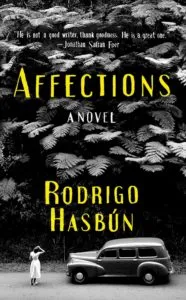 Affections by Rodrigo Hasbún, Translated by Sophie Hughes
Affections by Rodrigo Hasbún, Translated by Sophie Hughes
Last but not least, Affections is a novel based on the life of Third Reich cinematographer Hans Ertl and set in South America during the time of Che Guevara in the 1950s and 1960s. The Ertl family flees to Bolivia following the fall of Nazi Germany. After Hans Ertl attempts to lead an expedition in search of a legendary Inca city, his family life begins to fall apart. This novel is told from the perspective of Hans and his daughters as they become involved in the revolution on Bolivia.
What are your favorite historical fiction novels in translation? Let us know in the comments.- 5 Historical Fiction Books Set in Latin America
- 8 Historical Horror Novels You’ll Want to Shove in the Freezer
- 8 Must-Read Diverse YA Historical Novels
- 5 Historical Novels By Southeast Asian Writers About Southeast Asia
- 8 Great Novels Set During the American Civil War Era
- 7 Historical Mysteries Set Around The World
- 8 Amazing Historical Fiction Books with Lesbian and Bisexual Women
- Sympathetic Royals in Children’s Fiction: The Democracy of Perspective in Carolyn Meyer’s Books
- 9 Historical Fiction Books About Artists